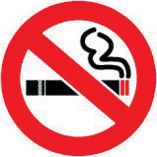 |
Reports according to Master’s order and rating

In 1987, member states of the World Health Organization (WHO) passed a resolution that created a World No-Tobacco Day, which aimed to reduce the 3.5 million deaths resulting annually from smoking-related health problems. Since 1988, May 31 is the day observed around the world to draw global attention to the tobacco epidemic and the preventable death and disease it causes.
With increased public awareness about the health risks of smoking, many countries have moved towards a ban on smoking. The USA, with the world’s biggest tobacco industry and many high profile court cases, has led the way. In 1990, San Luis Obispo, California, became the first city in the world to enact a law that prohibited indoor smoking in all public buildings. Since then numerous cities and states have followed suit. Some of the recent ones are highlighted below.
After four years of coordinated effort, an agreement was reached in May 2003 among WHO’s member states in the global “Framework Convention on Tobacco Control (FCTC)” treaty. Since then, many WHO member states signed and ratified the treaty. After the 40th ratification (by Peru), the treaty came into effect in February 2005. To date, 168 countries have signed the treaty, and 141 have ratified it, thus becoming Parties to be legally bound by the Framework conventions and protocols.
This landmark public health treaty, which puts forth guidelines to control tobacco supply and consumption, is a major step forward for the health of people in all nations and a milestone for international collaboration in a globalized world.
Europe, previously known for its deep-rooted smoking culture, has recently become a world leader in legislation to ban smoking. Since 2004 Ireland, Norway, Italy, Malta, Sweden and Scotland have banned smoking in public places; many others have introduced or plan to introduce similar laws. In 2003, the EU passed a directive requiring all member countries to ban tobacco advertisements in all publications, on the radio and on the Internet by July 31, 2005.
The same is also happening in other parts of the world. The Islamic countries of Iran and Syria recently passed comprehensive anti-smoking laws. And a growing number of scholars throughout the Muslim world are classifying tobacco as “haram” – prohibited by Islam, which has led to proposals of new legislation by government leaders. Hence almost every Muslim country is now proposing bans on smoking.
The following highlight is a humble attempt to offer a glimpse into this phenomenal global movement.
Nepal is the latest to become an FCTC Party, ratifying on November 7, 2006. A government official announced in June that the country plans to ban smoking in public places as well as banning tobacco advertisement from print media, under an order from the country’s Supreme Court.
Finland revised its Tobacco Control Act in March 1995 to prohibit smoking in all common and public premises, including offices. A study indicates that this has led to “significant” reductions in smoking. In June 2006, the Finnish Parliament unanimously approved a bill that further bans smoking in bars and restaurants, effective June 2007.
In the USA, 14 states and over 2,000 cities, including New York, Los Angeles and Chicago, have adopted legislation against cigarette smoking in enclosed public places. Recent ones include: Calabasas, California, which banned smoking in almost all outdoor as well as indoor public places. This is believed to be the most comprehensive ban in the United States; the county of San Diego, which banned smoking at parks, beaches and other popular open spaces in September 2006; Ashland, Kentucky, which prohibited smoking in all enclosed public places and offices as well as outdoor arenas, venues, and restaurant patios and decks, effective October 2006; and Hawaii, which became the 14th smoke-free state on November 16 when its stringent anti-smoking law went into effect. The US capital of Washington, D.C., is joining the list in January 2007.
Effective October 2006, smoking is absolutely forbidden everywhere in Luxemburg, even in the covered street stalls of the open air supermarkets. Restaurants are completely smoke-free.
In Australia, the country of Tasmania was the first to introduce a total indoor smoking ban in January 2006; all enclosed areas of pubs, bars and clubs in Western Australia are non-smoking since August 2006; Australia Capital Territory will enjoy smoke-free public places by Dec 2006; Queensland’s anti-smoking laws, introduced in July 2006, are believed to be Australia’s toughest, prohibiting smoking in all pubs, clubs, restaurants and workplaces, as well as commercial outdoor eating and drinking areas and outdoor public places, e.g., patrolled beaches, children’s playground equipment, major sport stadiums, and within 4 meters (13 feet) of non-residential building entrances.
Korea banned smoking in hospitals, day-care
centers, kindergartens as well as other educational premises. No-smoking
zones are required in electronic game centers, Internet cafes, comic book
libraries, baseball and soccer stadiums, large restaurants, trains, and
outdoor platforms of subway stations. Moreover, all public health centers
in the country provide free clinics for those who want to stop smoking.![]()
For a detailed list of non-smoking policies throughout
the world, please visit:
http://www.suprememasterchinghai.tv/no_smoking.htm
(Only English available)
References:
http://www.fctc.org/treaty/index.php
http://www.smokefreeworld.com/index.html
http://en.wikipedia.org/wiki/List_of_smoking_bans
| << | Contents | >> |
|
Refer this page to friends
|
||